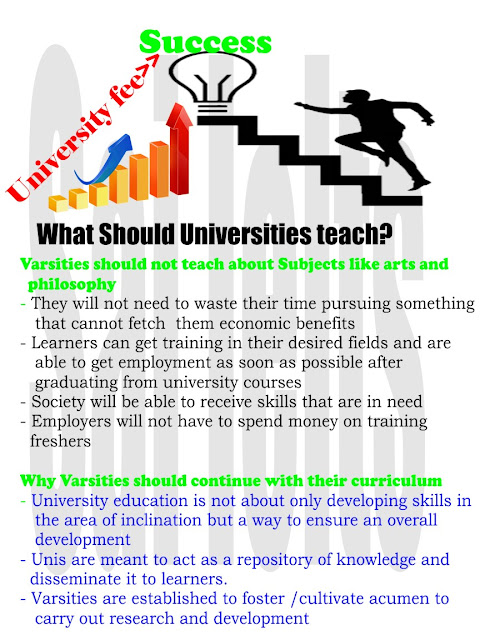Rising university fees and scarce employment prospects for graduates have led some people to say that universities should not teach arts subjects, like philosophy and history, and only offer practical degrees. To what extent do you agree or disagree?
The attitudes towards the proposal of varsities altering their curriculum, in the light of rising joblessness and cost of university education, and disseminating skills that can guarantee employment instead of topics like arts, are ambivalent, and thus, need a profound analysis.
Universities following this arrangement, would be able to engender know-how required to obtain gainful employment in the desire domains, and those graduating would not need to run from pillar to post, and pay out of the nose to gain employable skills, post-completion of their studies. This would offer them a much needed respite in the pressing times of the economic hardships and they would be in a position to earn money as soon as they complete university to support themselves and their families.
This can be corroborated by citing precedents of certain reputed universities in the UK, the USA, Australia and Canada that have integrated programs that churn out trade specific skills in the domains of information technology, project management, retail management, and supply chain management, to name a few, in their course list. The outcomes of this evolution have been quite favorable: graduating learners are able to obtain jobs quickly post-culmination of their pursuits.
However, those skeptical of this suggestion, despite their objections lacking in substance, feel this would cause a degradation in the quality of education being afforded by universities; these establishments are meant to foster all-round personalities imbibed with wisdom and critical thinking, allowing students to find solutions and innovate instead of delivering rote learning that only produces robots.
To conclude, disputes aside, this suggestion can be deemed as completely acceptable as correct paradigm needs inventive solutions that facilitate the future generation and allow them a comfortable life; thus, varsities should deliver programs that target occupational proficiency.

